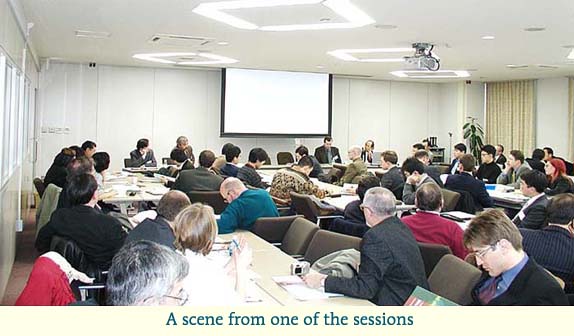| Annual Newsletter of the Slavic Research Center,
Hokkaido University |
||
| No.12
, December 2004 |
back to INDEX>> | |
Essays
| INOUE Koichi |
Victor Shnirelman |
Paul Werth |
SRC Winter Symposium 2004 (Jan.)

The first international symposium sponsored by the 21st Century COE Program "Making a Discipline of Slavic Eurasian Studies: Meso-Areas and Globalization" was held from January 28 to 31, 2004. The title of the symposium was "Emerging Meso-Areas in the Former Socialist Countries: Histories Revived or Improvised?" As a new activity, on February 1, we organized the International Workshop by Junior Scholars. Twenty-two foreign scholars were invited from nine countries (Russia, Ukraine, USA, UK, Estonia, Belarus, Lithuania, Poland, and Armenia) and two unrecognized states (Transnistria and Abkhazia). More than 125 scholars living in Japan participated in these events. As a whole, 33 papers were presented. The discussion was mainly held in English, and interpretation from English to Russian was provided.
We proposed the concept of meso-areas as applicable not only for Slavic Eurasia but also for other territories. Therefore, the representatives of other area studies (Islam, China, Europe and others) were invited. The conceptualization of meso-areas is closely connected with the task to develop Japanese Slavic studies into Slavic Eurasian studies. For this purpose, the symposium focused on the Baltic and Caucasian countries, Moldova, and Belarus, which have not been studied in depth in Japan. The symposium also brought attention to current issues, organizing papers on the problems of unrecognized states and Islamic radicalism.
Four young foreign scholars (from Russia, USA, Ukraine, and Belarus) were invited to give papers at the International Workshop. Young speakers from Japan were selected through open competition.
Most papers will be published in a collection forthcoming in early 2005. Several papers will be published in the next issue of Acta Slavica Iaponica and a collection on Russian imperiology, forthcoming in mid-2005.
MATSUZATO Kimitaka
IEDA Osamu (SRC)
"Regional Identities and Meso-Mega Area Dynamics in Slavic Eurasia:
Focused on Eastern Europe"
Vitaly Merkushev (Institute of
Philosophy and Law, Ural Division, RAS, Russia)
"Is It Easy to Globalize the World? The Expansion of the Shengen
Territory and Freedom of Movement in a Wider Europe"
Yaroslav Hrytsak (Lviv University,
Ukraine)
"On Sails and Gales, and Ships Driving in Various Directions:
Post-Soviet Ukraine as a Test Case for the Meso-Area Concept"
EYAMASHITA Norihisa (Hokkaido
University, Japan)
"Empire or Post-Empire? The Concept of 'Long Century' and the
Consequences of Globalization"
Vello Pettai (Tartu University,
Estonia)
"The Baltic States: Histories Both Revived and Improvised"
HASHIMOTO Nobuya (Hiroshima
University, Japan) and MIZOBATA
Satoshi (Kyoto University, Japan)
"Russian-Speaking Minorities in the Baltic Countries"
FUJIMORI Shinkichi (SRC)
"Ukraine's Gastraders: A Case of Political Economy in a Transition
Country"
Uladzimer Rouda (Belarus
University)
"The Reserves of the Policy of Social Populism in Modern Belarus"
Stephen White (Glasgow University,
UK)
"Values and Democracy: Moldova in Comparative Perspective"
Dmitry Makarov (Institute of
Oriental Studies, RAS, Russia)
"Radicalization of Islam in Daghestan"
Magomed-Rasul Ibragimov (Dagestan
University, Russia)
"Islam and Ethnicity in Daghestan"
Stanislav Lakoba (Abkhazian
University)
"Abkhazia under the Conditions of the Redivision of the World"
Tevan Poghosyan (International
Center for Human Development, Erevan, Armenia)
"Nagorno-Karabakh: Historical Background, Current Challenges and the
Possible Role of the International Community"
Ilya Galinskii (Pridnestr
University, Moldova)
"Legitimacy of the Political Authorities of the Pridnestr Moldova
Republic: Sociopolitical Aspects"
Commemorative Lecture by Aleksandr
Bobrov (SRC)
"The Russian 'Double-Faith' (Paganism and Christianity): The Historical
Aspect"
Andrzej Nowak ("Arcana", Krakow,
Poland)
"Poland: Between Imperial Temptation and Anti-imperial Function in
Eastern
European Politics (from the eighteenth to twenty-first century)"
Darius Staliunas (Institute of
Lithuanian History, LAS, Lithuania)
"From Ethno-Centric to Civil History: Changes in Contemporary
Lithuanian Historical Studies"
Dmitry Gorenburg (CNA Corporation,
USA)
"Tatar Identity: A United, Indivisible Nation?"
Valentyna Nadolska (Volyn
University, Ukraine)
"Volynia under the Russian Empire: Migration Process and Cultural
Interactions"
MATSUZATO Kimitaka (SRC)
"German Elitism in a Populist Empire: The Ostzei Question in a
Comparative Perspective"
Tiit Rosenberg (Tartu University,
Estonia)
"Russian Government, the Baltic German Elite and the Estonian Public
During the War and Revolution 1914-1917"
Andrei Znamenski (SRC)
"The Object of the Most Tender Feelings: Native Spirituality and
Siberian Regionalism, 1860-1920"
Marina Mogil'ner (Kazan
University, Russia)
"The Most European Science in Russia: Defining the Empire
Anthropologically"
Leonid Taimasov (Chuvashi
University, Russia)
"Chuvashi at the Confessional Crossroads: the Problem of Choice in
Faith
and Ethnic Identities in the Writings of Chuvashi Authors, the 19th –
Early
20th Centuries"
Gulnaz Sharafutdinova (George
Washington University, USA)
"When Do Elites Compete? The Determinants of Political Competition in
Russian Regions"
CHIDA Tetsuro (Tokyo University,
Japan)
"The Central-Republican Relationship and Party Elites in the Soviet
Union: Kazakhstan (1970-1991)"
Oleksandr Syniookyi (Laboratory of
Legislating Initiatives, Kyiv, Ukraine)
"Will the Ukrainian Parliament Counterweigh Superpresidentialism?"
Aleksandr Semyonov (Smolny College
of Liberal Arts and Sciences, Russia)
"Making Politics, Undoing Empire: Political Reform in Russia at the
Beginning of the 20th Century"
IKEDA Yoshiro (Tokyo University,
Japan)
"The Development of an Imperial Representation of Russia in the Civil
War: The Case of the Moscow Bolsheviks"
GOTO Masanori (SRC)
"Workers Tell: Representation of Personality in the Compilation of
'Histories of Factories' During the Stalinist Era"
KOSHINO Go (SRC)
"The Representation of the Belarusian Language in Contemporary
Belarusian Literature"
Andrei Lobatch (Belarusian State
Economic University)
"Peculiarities of the Integration Process Between Belarus and the
Russian Federation: Economic and Political Aspects"
KUWATA Masayuki (Tokyo Institute of
Technology, Japan)
"The Availability of Soviet Statistics for Analyses of Ethnic Problems:
Russia, Ukraine, Central Asia, and the Whole Union"